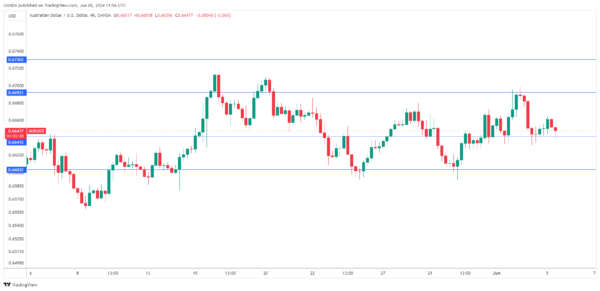After starting the week with sharp swings, the Australian dollar is showing little movement on Wednesday. AUD/USD is trading at 0.6644 in the European session, down 0.06% on the day.
Australian GDP posts 0.1% growth
Australia’s GDP was a disappointment, with a gain of just 0.1% q/q in the first quarter. This was lower than the revised 0.3% gain in Q4 2023 and below the market estimate of 0.2%. This marked the lowest growth in six quarters due to weak domestic demand and a decline in net trade. Yearly, GDP grew by 1.1% in the first quarter, the weakest level since the fourth quarter of 2020.
How will the Reserve Bank of Australia view the soft GDP release? The RBA is hamstrung between stubbornly high inflation and a weakening economy, as today’s GDP indicated. The RBA has maintained the cash rate at 4.35% since last November and Governor Bullock reiterated on Wednesday that a rate hike is a possibility. Bullock told a Senate committee that if inflation stalled, the RBA “won’t hesitate to move and raise interest rates again”.
The GDP data is unlikely to prod the RBA to cut rates but will dampen expectations of a rate hike. This could mean that the RBA will hold rates into 2025 until policy makers are confident that inflation is firmly under control.
In China, the Caixin Services PMI improved to 54.0 in May, up from 52.5 in April and beating the market estimate of 52.6. This was the fastest pace of expansion in services since July 2023, driven by stronger domestic and external demand. Economic developments in China can have a significant impact on the Australian dollar, as China is Australia’s largest trading partner.
AUD/USD Technical
- AUD/USD continues to test support at 0.6641. Below, there is support at 0.6603
- 0.6692 and 0.6730 are the next resistance lines

